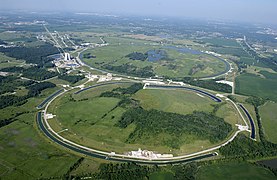
Recently, particle physicists working a the "super collider" at the Fermi Laboratory in Batavia, Illinois, made what they consider to be a potentially earth shattering discovery. After much experimentation, they concluded that a muon "wobbles." Why is this important? It is important because, in the view of these physicists, this means that there are other subatomic particles which we have yet to find, particles that affect the movement of muons and, consequently, the workings of the universe.
Put another way, per these physicists, we may not fully understand the essential structures and governing forces of the universe after all. We may need to revise our understanding of how the cosmos holds together.
Once more, we come face to face with our human inadequacy and inexorably finite and limited grasp of what exists--and why it does. This is in fact a cause for celebration. We are reminded anew that for all our intelligence, insight, and drive, we may never really comprehend, outside of acknowledging a presence of transcendence, not so much how we got here but, more importantly, why we are even here at all.
No comments:
Post a Comment